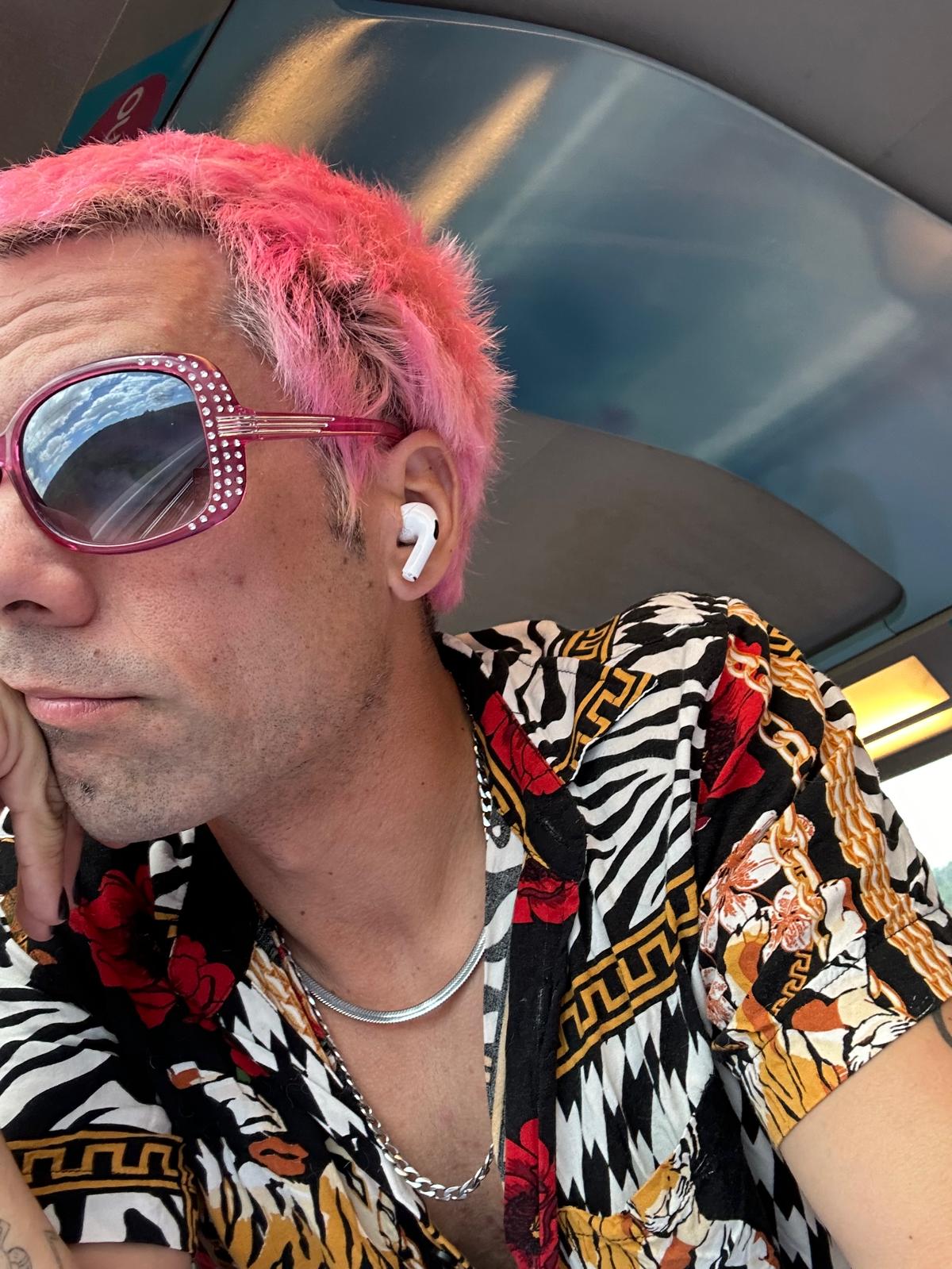Search
To search for an exact match, type the word or phrase you want in quotation marks.
A*DESK has been offering since 2002 contents about criticism and contemporary art. A*DESK has become consolidated thanks to all those who have believed in the project, all those who have followed us, debating, participating and collaborating. Many people have collaborated with A*DESK, and continue to do so. Their efforts, knowledge and belief in the project are what make it grow internationally. At A*DESK we have also generated work for over one hundred professionals in culture, from small collaborations with reviews and classes, to more prolonged and intense collaborations.
At A*DESK we believe in the need for free and universal access to culture and knowledge. We want to carry on being independent, remaining open to more ideas and opinions. If you believe in A*DESK, we need your backing to be able to continue. You can now participate in the project by supporting it. You can choose how much you want to contribute to the project.
You can decide how much you want to bring to the project.

We live in the past. We coexist with it. Through it, we are in every moment. After the pandemic, that giant eraser that fell upon our heads, questioning our future and our past, many theoretical and public voices have advocated for a savage stoicism, the perfect umbrella for stark individuality, bordering on selfishness, which, like a shout mere inches from our face, violently demands that we be present. That only this instant exists and that each breath is an anchor. You are here, you are here, breathe, here, concentration, mantra, om mani padme hum.
I, an occasional meditator, will not be the one to question the therapeutic values of meditation or the psychological benefits of not burdening oneself with past or future crap on a daily basis, by golly it works!, and hey, it makes you live a bit more peacefully. But that place is not real. That much-touted and promoted present in reels and TikToks is not possible. It simply is not. The present is an invented other-time that we cannot access. It slips away because it cannot remain; only the past, the lived, can remain, and no matter how poorly remembered or highly fictionalized, it is actually the only certain thing. Fiction or not, a super-vitaminized story or a vague memory, we can only inhabit the past. Alone, we are our continuous past.
That is why nostalgia sells. Because we are it. We are nostalgia. And we want more of ourselves. If we admit that the 21st-century homo has become an atomized being who lives his life alone in contact with a virtual-real world akin to the first novel of Ready Player One, we must understand that we need ourselves, our history, our narrative, in a continuous assault on what we are, which is what we have been, what we are becoming, in the past, every second that overtakes us, and that this perennial meta-narrative of our life, those Warholian fifteen minutes of fame elevated to the nth power, makes us spectators of our life to such an extent that sometimes we confuse creation with contemplation, action with exposure, reality with myth. We no longer need to tell our grandchildren the glorious past of wars or heroic conquests while they try to jump off our bony knees to go play; we do not need to fill obtuse tomes of fraudulent memoirs to extend our glory or dissipate our unconfessed defeats and agonies among grandiloquent phrases. The pure, clear, and continuous exposure of our being impacts our way of being in the past.
Etymology solves almost all the dilemmas we might face. With etymology, we could solve wars and conflicts that have been unresolved for years. Nostos is “returning” home. And algos is “pain.” But we, instead, have drawn a wonderful and shiny past to return to, and buy, and consume that summer of love that never existed but seems to us, among Curro’s hugs and races with Cobi, the best. But I insist on etymology. There is a vague sense of deception in this continuous vital revival. Tired of the present that does not exist, we have decided to give ourselves to the past, and nostalgia looks at us with open arms and young parents, but as Astrud sang and Douglas Coupland wrote: “Nostalgia is a weapon.” What we do not know is that most of the time, that weapon points directly at us. And we have nothing with which to defend ourselves.
Let us recap. Why do we flee backward? We could say that from the myth of the Enlightenment to World War II, in art, design, fashion, music, politics, literature, looking to the past was really kitsch, passé (obviously), faded and worn-out, like tango, and that what really mattered was the future: new techniques, new lands, new rhythms, the Hegelian mixture that makes us advance, discover, synthesize new broths, surpass new horizons, achieve sounds never heard on synthesizers never dreamed of, in short: the future.
Our balm, the space to which our totem animal called us, our place to be, was the future. The space race, the atomic world, computing, everything pointed to the future, always forward, not a step back, to infinity and beyond. It was in the future where our soul rested and our effort found relief and reward. If you strive, you will have a house, your TV will have a remote control, your band better instruments, and your medicine will heal more. But in the last thirty or forty years, that myth of the future has disappeared. Nobody tries to dress like in the future, nobody tries to compose like in the future, and nobody tries to write like in the future. The future has lost its shine. It has lost its allure. No one trusts it anymore; no one believes we are heading to a better place. Its attraction, after so many years of pushing our dreams and potentialities, has simply vanished.
The reasons are several. The general welfare state is one. I do not say we are doing great, but we have reached a cruising speed of general well-being that flattens us; we do not respond to injustices and understand imbalance as an intrinsic part of balance. We raise our little hands like the emoji that doesn’t quite know what to say, and we follow the step. That on one hand. On the other, we are the first generation (sorry for this obviously common place) that lives worse than its parents in terms of possessions. We have better medicines, better hospitals, better tools, the internet, AI, microsurgery, but since we have fewer houses and fewer cars, we have been told that we are, I insist, the first generation that is going to live worse than its parents. I could argue it long and hard, but the fact is that people have believed it. We are so result-oriented and mediocre in general that if we are told three times that not having two houses means we are worse off than our parents, we nod and put on a sad face and pout.
Playing the victim is cool; it takes the pressure off.
The internet has also betrayed us a bit. We thought it was the future becoming incarnate (virtually, what things) before our eyes, and yet it was the snake-tongued trap that has made us fill all our future anxieties with the past because the internet is the key place to visualize our memories and remake them over and over. Before, the past, nostalgia, was a story, a magical tale passed from grandparents to grandchildren and maybe some old yellowing photo in the attic. Now it is real. Now it is on the net. You can touch it every day. Watch your videos. See your past continuously and forget about that second home you will never have. This is no way of speaking; channels like my dear David Martínez’s (Born Nostalgic) offer complete day-long programming with series and cartoons from our childhood on Twitch. And the success is thunderous.
An entire generation reliving and rewatching its past in real-time. When I wrote “Videoclub” (my first novel, in which a character decides to open a Videoclub and live every day as if it were 1994), I thought I had written a nice comedy, not a dystopian horror work, how much I miscalculated my perspective.
But I try to focus and wrap up.
The present is unattainable, no matter how much Buddha and Marcus Aurelius tell us. The future no longer matters to anyone because no one believes in it. And it is like Fantasia in “The NeverEnding Story”; if no one believes in it, it disappears. (I had to insert a nostalgic ’80s reference, forgive me).
Therefore, it is perfectly logical that people have turned to the past to feel good.
But ETYMOLOGY PLEASE, it warns us over and over that we are heading towards pain. It is not a safe or pleasant place, that nostalgia, it is a painful return home. Not because we will find demons, but because it takes us away from ourselves, it evades us, it narcotizes us, and we fall into nostalgia as into eternal opium dens from which we cannot escape.
Fernández Mallo says we return to the first times for the security offered by the ritornello (we can translate it as chorus), that repeating what we have already done produces a comfortable state for us. But, I dare to add, also paralyzing. However, there exists in tonal music (the normal music that we all hear on the radio or from our favourite artists and that takes care of structuring the harmonies and relationships between them in degrees), a figure widely used in the Anglo-Saxon and Latin American worlds, which, although more unusual to us, has been valued in recent years. It is the idea of “home tone.” I try not to be too technical (something I also couldn’t be) to explain this. The tonality in which a song develops (for example: C) is considered a home. A refuge. A rest. The place from which the melody sets out on an adventure. To generate tensions with other chords (for example, F, which is a fourth degree of C). The melody, when changing chords, undertakes a kind of hero’s journey with the sole mission of returning home. The whole path is thinking about the return, every step into the abyss, the tension, the fifth degree, the minor seventh, the augmented fourths, all the musical frictions and tensions the melody goes through are only understood if the goal is to return home, and that nostalgia (that painful return) is the sole reason for each note, which fights to remember and return to that primordial chord, that home tone where finally, after so many years of adventures and obstacles, we can rest. Perhaps all art, including music, of course, hides something of returning home after that painful journey, something of always thinking about how to resolve that tonal tension, to rest forever in that harmonic haven we call home, past, childhood or, assuming the pain it entails, nostalgia.
I return to Mallo, by the way also a very interesting musician-artist, and in his fantastic “Madre de corazón atómico,” he writes the following: “We are all contemporaries of everything that exists; there is neither old nor new.” This phrase made me think of a conciliatory future (I do think about the future, damn it!). I do not want to end this with the taste of a clumsy anti-nostalgia manifesto, nor waving the flag of the distant and space-bound future. So I propose that maybe, if we can hold the hand of the forty-year-old who watches The Fresh Prince of Bel-Air on loop, the stoic meditator who never separates from the beat of the clock, and the pseudo-AI brainiac who eagerly awaits the future low-cost space travel, we can understand that we are all everything in all places and at the same time, as in the Oscar-winning movie, and thus enjoy our past without burden or idealization, our future with excitement and energy to keep working and advancing, and our present, because after all, it seems to be where, whether we like it or not, we will have to be for the rest of our lives.
Though as for how to do that, I honestly wouldn’t dare to give any lessons.


Aaron Sáez Escolano is a musician, composer, student, and writer. Busy travelling and recording with various projects such as Varry Brava, Carey, Piyama, Dúo Orquesta Regalizes, as well as his solo career and making music under the name Neoverbeneo, he is gradually finishing his degree in Art History and in 2025 he will publish his second novel. He only asks God to keep writing, performing and making songs wherever in the world he is allowed to be for a while.
"A desk is a dangerous place from which to watch the world" (John Le Carré)